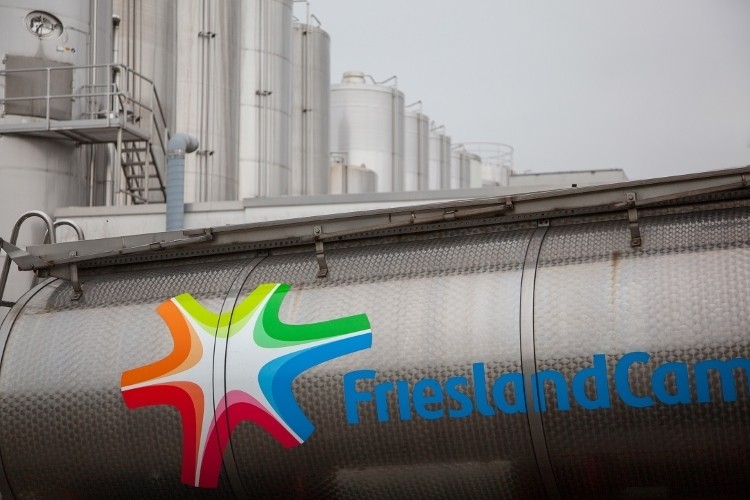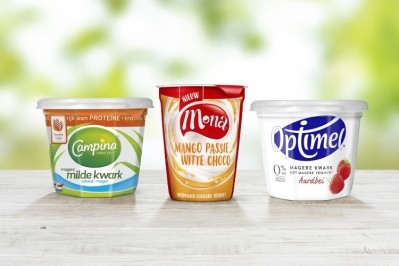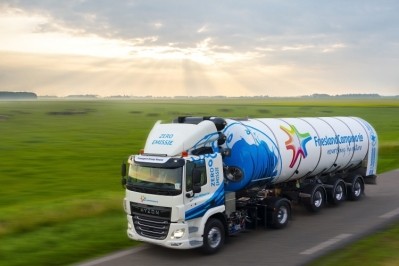FrieslandCampina half-year profits drop 42.6%

Profit decreased by 42.6% to €62m ($73.1m), which the company said was mainly due to a €57m ($67.2m) provision for a court ruling in Thailand and lower infant nutrition results in the business groups Specialised Nutrition and Ingredients as a result of continuing difficult market conditions in Asia.
Underlying operating profit, excluding provision for the court ruling in Thailand and currency translation effects, decreased by 8.6% to €202m ($238.3m).
It added accelerated implementation of the Our Purpose, Our Plan 2.0 strategy, with associated structural cost reductions of at least €100m ($118m) per year starting in 2022, is on track.
In November 2020, FrieslandCampina announced it would accelerate its transformation with a focus on growth, structurally lower costs and an optimization of the organizational structure. The cooperative said this is on track. Up to year-end 2021, approximately 1,000 jobs will be eliminated. Compared to the end of June 2020, a reduction of about 700 FTEs has been realized to date.
Total restructuring costs amount to €150m-€175m ($177m-$206.4m).
The business portfolio is also being evaluated as part of the accelerated transformation of the company. The focus is on investing in strategic priority markets and disposing of non-core activities.
A strategic partner was found for animal feed business Nutrifeed, in this respect. In addition, the sale of Russian consumer activities to Ehrmann was announced. This transaction is expected to be completed in the third quarter.
Hein Schumacher, CEO of Royal FrieslandCampina N.V., said, “Good results by the Food & Beverage and Trading business groups and realized cost reductions were not sufficient to offset the strong headwind in infant nutrition. Market conditions in this for FrieslandCampina important category remain difficult. This had a significant impact on the results of the Specialised Nutrition and Ingredients business groups.”
Schumacher said as lockdowns in many markets are being relaxed, out-of-home activities are recovering and the global demand for dairy is increasing, resulting in rising basic dairy prices.
“This is good news for our trading business and for the milk price paid to our members. However, the corona pandemic is not over yet and neither is the uncertainty that it brings, particularly not in countries where the vaccination coverage is still relatively low. In recent weeks we have seen the numbers of infected people increase rapidly again in various countries, so caution is still required. For the second half of the year, on the one hand we are cautiously optimistic about the recovery of the consumer and out-of-home channels, but on the other hand, the Asian infant nutrition market is not expected to recover.”
Results in detail
Consumer retail and e-commerce sales recovered. The revenue of the Food & Beverage business group rose by 1% and excluding currency translation effects by 4.1%. The Parrano, Chocomel and Valess brands, in particular, performed well. Recovery of the out-of-home channel, improved performance in Pakistan and an effective market approach in large parts of Africa also contributed to revenue growth for Food & Beverage.
The revenues of Specialised Nutrition and Ingredients were under pressure due to the difficult infant nutrition market and decreased by 14.9% and 3.9%, respectively. Sales of Friso Gold in China and Hong Kong, in particular, decreased, while Friso Prestige in the ultra-premium segment in China grew. Higher volumes and price increases drove an increase in revenue in the medical, seniors and sports nutrition segment.
Revenue of the business group Trading fell by 3.9% due to lower milk supply and lower sales of liquid products such as raw milk, cream, skimmed milk and milk concentrate.
Operating profit decreased by 41.2% to €130m ($153.4m) in the first half of 2021, and profit decreased by 42.6% to €62m ($73.1m). The underlying operating profit, excluding the provision for the court ruling in Thailand and currency translation effects, decreased by 8.6% to €202m ($238.3m). The underlying result of the Food & Beverage business group rose because of the positive selling price trend, growth in priority brands and an improved market approach. The business group Trading benefited from higher prices and consequently made a significantly smaller loss than in the comparable period last year. The results of Specialised Nutrition and Ingredients decreased as a result of unfavorable market trends in the infant nutrition market.
Operating cash flow in the first half of 2021 was €46m ($54.3m), compared to the first half of 2020 at €125m ($147.5m). The decrease was primarily caused by lower results and a one-off contribution of €88m ($103.8m) to a pension plan committed to in 2005.
The milk supplied by member dairy farmers in the first half of 2021 decreased by 2.2% to 5.029bn kilos, primarily due to cold weather in the first months of 2021 and increased feed prices.
The milk price for member dairy farmers over the first half of 2021 increased by 1.8% to €37.25 ($43.94) per 100 kilos of milk, excluding VAT. The increase, in part, was due to an increase in commodity dairy prices resulting from growing market demand. The organic milk price was €49.16 ($57.99), excluding VAT, per 100 kilos of milk.
Due to the lagging result in the first half of 2021, there will be no interim payment.
By 2050, FrieslandCampina said it aims to be producing (net) climate-neutral dairy and, by 2030, it intends to reduce the emission of greenhouse gases by more than one-third (compared to 2015) in line with the Paris Climate Agreement and Green Deal climate targets.
FrieslandCampina said it aims to have its packaging 100% recyclable globally by 2025, and circular and climate-neutral by 2050. In the first half of 2021 fully recyclable PET plastic bottles using 100% recycled materials were introduced by various international brands. New packaging for Campina’s organic line in the Netherlands was developed with a reduction in packaging materials of 22 tons per year.
For the second half of 2021, FrieslandCampina expects a continuation of the situation in the second quarter. The company said it is cautiously optimistic about the recovery of the consumer and out-of-home channels, however, the Asian infant nutrition market is not expected to recover. It said the pandemic and its impact on the company remains uncertain. FrieslandCampina expects basic dairy prices to continue around current levels in the second half of 2021 and, as a result, milk prices are expected to do the same.












